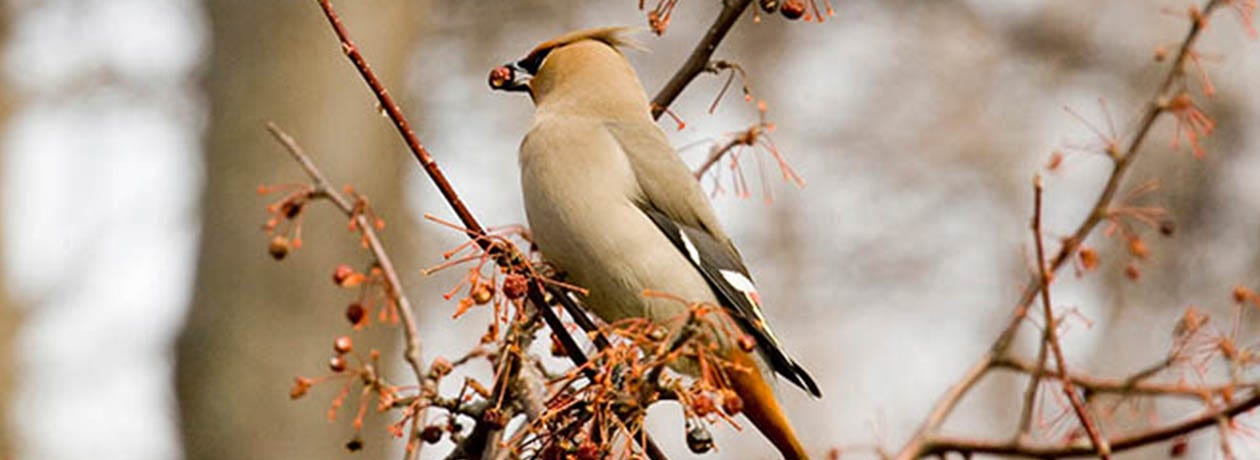Busted! 5 Bird-Feeding Myths Put to Rest

Like any hobby, there are tricks to the trade and expert knowledge that many individuals can benefit from, and wild bird feeding is no different. Whether your customers have been feeding birds for a few months, or years, the rumor mill is always running, and you’ve probably heard them all.
We’re here to help you set your customers’ minds at ease and put five popular bird feeding myths to rest.
Myth 1 - Bird feeding in the late summer/fall will prevent migration.
Just because the weather is cooling, doesn’t mean your should pack away feeders or seed for the winter. Some birds, such as robins or waxwings, change location often based on food sources, but most will move from food supply to food supply because of weather, daylight, and genetic instincts.
For example, American Goldfinches can be founding munching on thistle with snow on the ground. So instead, advise your customers to keep the seed feeders hanging to help wild birds maintain their energy throughout the colder season.
Myth 2 - Peanut butter causes wild birds to choke.
Some avid birders are worried that offering peanut butter to their feathered friends will cause digestive problems resulting in death, which is not the case. The high-protein snack is very beneficial to wild birds and delivers a high-calorie, high-fat alternative to bird seed. Are they concerned peanut butter is too sticky? Then tell them to mix in cornmeal or flour until reaching a crumbly texture.
To help your customers understand this, occasionally schedule some peanut butter pinecone bird feeder workshops at your store. Basically, you’ll set up a station in your store to let customers cover a pinecone in peanut butter and bird seed, which can then be hung outside for birds, squirrels and chipmunks.
Myth 3 - Birds’ feet will freeze to metal feeder perches in the winter.
People know the “don’t stick anything wet to ice” rule. But that helpful tip doesn’t apply to birds’ feet. Since bird feet have a low blood flow and lack of sweat glands, there’s nothing to stick to the chilled metal perches.
The only thing your customers need to worry about through the winter season is keeping snow and ice off the feeder. Also keep the area under the feeder cleared.
Further, you can assure your customers that they can leave a bird bath out all winter long. Just tell them to add a heated brick to it each morning to unthaw it. Bird waterers are another valuable resource for birds in the winter.
Myth 4 - Feeding birds from feeders makes them dependent on you.
On average, bird feeders provide 25 percent of a wild birds daily food supply. Other popular food sources include, insects, berry-producing trees and bushes, and trumpet-shaped flowers to name a few. To maximize the nutritional value for your feathered friends, place your feeder in optimal position near a natural source.
Even in the winter, bird feeders only provide a small proportion of a seed-eating bird’s diet. Remind your customers that birds are wild animals driven by instinct, so it’s highly unlikely for them to simply starve to death when someone forgets to fill a bird feeder.
Myth 5 - Mixed seed is a bad choice when filling your bird feeders.
Before a customer selects a bag of mixed seed, make sure that they know which bird species they want to attracted to their feeders, since certain species only eat certain seeds. However, offering a mix of sunflower, millet, milo, nuts, and other seeds, bird lovers will be able to bring a wide variety of wild birds to their yard.
Just advise your customers to monitor seed levels in their feeders, clean the feeders regularly, and remain vigilant about keeping the ground below a feeder clean. Picking up the areas under a feeder will limit the growth of unwanted weeds and curb visits by unwanted animals looking for a free meal.
